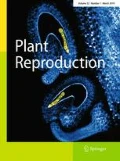Abstract
During the past few years pollen tubes grown in vitro became a popular model system for cell biology studies of signal transduction in plant cells. Here we report a simple and fairly inexpensive way of studying protein function by transiently perturbing expression of the target gene in living pollen tubes. The ability of antisense oligodeoxynucleotides (ODNs) to bind to complementary mRNA sequences was used to selectively inhibit gene expression and thus assess the putative function of specific proteins in tip growth. The delivery of ODNs to growing pollen tubes was accomplished with the help of a liposomal formulation, originally developed for transfection assays in animal cells. The limitations and potentialities of this technique are discussed.
Similar content being viewed by others
Author information
Authors and Affiliations
Additional information
Received: 23 November 2000 / Revision accepted: 29 May 2001
Rights and permissions
About this article
Cite this article
Moutinho, A., Camacho, L., Haley, A. et al. Antisense perturbation of protein function in living pollen tubes. Sex Plant Reprod 14, 101–104 (2001). https://doi.org/10.1007/s004970100086
Issue Date:
DOI: https://doi.org/10.1007/s004970100086




